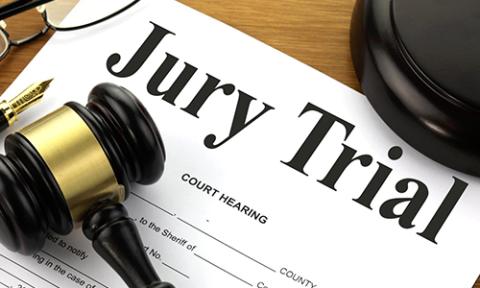Psychology academics publish new report on courtroom bias

Academics from the Faculty of Arts and Social Sciences (FASS) have published a new review on the potential sources of bias in juror decision-making.
Dr Lee Curley, Lecturer in Psychology, and Dr James Munro, Psychology Technical Lead, from the School of Psychology and Counselling, have collaborated with Dr Itiel Dror from University College London (UCL) to produce the review, which covers pre-trial bias, cognitive bias, confirmation bias in forensic experts, and jury deliberations. The research also suggests potential recommendations to attenuate bias.
The paper is the first to highlight how these biases interact and ‘snowball’ into each other in a courtroom, and shows links between decision-making, psychological science and legal processes.
Recommendations are given to attenuate biases and reduce their impact on jury decision-making. The research advises jury selection to maximise variety in perspective to challenge biases from individual jurors, as well as training of expert witnesses to avoid biases in their testimony, plus the use of certain techniques by expert witnesses to filter out biases. It also recommends education of legal professionals and jurors about effects of biases on decision-making.
The effective functioning of the legal system depends on the trust of the public. In the UK, courts are adversarial and use juries of our peers in society. This means that inexpert jurors are asked to evaluate evidence, discuss this evidence with each other and then reach a decision about the fate of an individual. Public trust in this process relies upon this system being as fair as possible. To ensure a fair trial, juries should base their decisions on rational interpretation of evidence and not their own biases. Similarly, expert witnesses should present their testimony in a way that minimises their own biases leeching into the evidence they present.
Unfortunately, biases are rife in jury decision-making from many sources that may build on each other. For example, jury decision-making has been shown to depend on juror's pre-existing beliefs, attitudes towards sex, race and crime types, the attractiveness of the expert witness, and to the manner in which complex forensic evidence is presented.
This review puts the spotlight on the sheer variety and quantity of sources and types of bias in order to provide a foundation and recommendations for how to deal with them. FASS academics worked alongside UCL’s Dr Itiel Dror, the most prominent international researcher of bias in forensic decision-making, in order to build upon the programme of work addressing jury decision-making.
The contents of the review are quite shocking and can, at first, be disheartening – highlighting how difficult it is for any jury to avoid the myriad biases that can contribute to its decisions. This review helps provide a timely and vital resource both in understanding the scale of the problems at hand and informing research and policy change to tackle the issues.
Request your prospectus
![]()
Explore our qualifications and courses by requesting one of our prospectuses today.